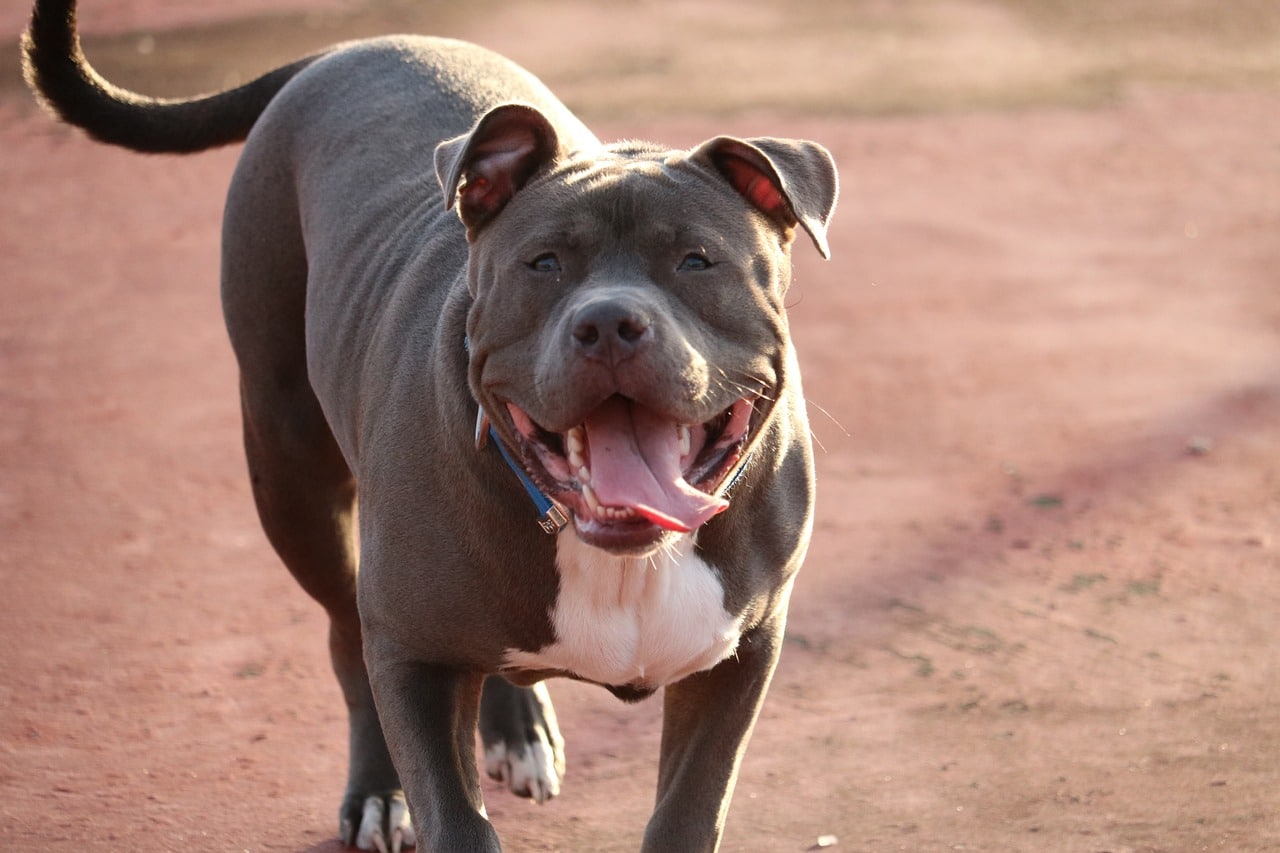 Shutterstock
ShutterstockAllergies in dogs can be a persistent and challenging problem, significantly impacting their overall well-being and requiring ongoing attention from their owners. Some dog breeds are particularly prone to allergies due to factors such as their genetic predispositions, specific skin types, and unique immune system responses. These allergies can present in various forms, including skin irritations, digestive disturbances, and respiratory complications. Owners can take proactive steps to prevent allergic reactions and ensure their pets receive the best care by identifying which breeds are more susceptible to allergies.
Boxer
 Shutterstock
ShutterstockBoxers are energetic and playful dogs but also highly prone to allergies. Their short coats and sensitive skin make them susceptible to environmental allergens like pollen, dust mites, and mold. Boxers can develop skin irritations, itching, and hot spots due to these allergies. Additionally, food allergies are common in Boxers, leading to digestive issues and skin problems. Owners should work closely with their veterinarians to identify and manage these allergies, including dietary changes, regular grooming, and medications to control itching and inflammation. Regular baths with hypoallergenic shampoos can also help alleviate symptoms.
Labrador Retriever
 Shutterstock
ShutterstockLabrador Retrievers are among the most popular dog breeds, known for their friendly and outgoing personalities. However, they are also prone to allergies, particularly skin allergies. Labradors can develop atopic dermatitis, a chronic skin condition caused by environmental allergens such as pollen, dust, and mold. Symptoms include itching, redness, and recurrent ear infections. Food allergies are also common in Labradors, requiring careful diet management. Owners should consult with their veterinarians to identify the specific allergens affecting their dogs and develop a treatment plan that may include dietary changes, medications, and regular grooming.
West Highland White Terrier
 Shutterstock
ShutterstockWest Highland White Terriers, commonly known as Westies, are small dogs with distinctive white coats. They are particularly prone to skin allergies, which can cause severe itching, redness, and hair loss. Environmental allergens like pollen, dust mites, and mold can trigger these reactions. Westies are also susceptible to food allergies, leading to digestive issues and skin problems. Regular veterinary check-ups and allergy testing can help identify the specific allergens affecting Westies. Treatment often involves dietary changes, medications to control itching and inflammation, and regular grooming with hypoallergenic products.
Bichon Frise
 Shutterstock
ShutterstockBichon Frises are small, fluffy dogs known for their cheerful and affectionate personalities. However, their curly coats and sensitive skin make them prone to allergies. Bichons often suffer from atopic dermatitis caused by environmental allergens such as pollen, dust mites, and mold. Symptoms include itching, redness, and recurrent ear infections. Food allergies can also affect Bichons, leading to digestive issues and skin problems. Regular grooming, including frequent baths with hypoallergenic shampoos, can help manage skin allergies. A carefully monitored diet and medications a veterinarian prescribes can help alleviate symptoms and improve their quality of life.
Golden Retriever
 Shutterstock
ShutterstockGolden Retrievers are beloved for their friendly and loyal nature, but they are also prone to allergies, particularly skin allergies. Goldens can develop atopic dermatitis due to environmental allergens like pollen, dust, and mold. Symptoms include itching, redness, and recurrent ear infections. Food allergies are also common in Golden Retrievers, leading to digestive and skin problems. Owners should work closely with their veterinarians to identify the specific allergens affecting their dogs and develop a treatment plan that may include dietary changes, medications, and regular grooming. Regular baths with hypoallergenic shampoos can also help alleviate symptoms.
American Pit Bull Terrier
 Shutterstock
ShutterstockAmerican Pit Bull Terriers are known for their strength and loyalty, but they are also prone to allergies, particularly skin allergies. Pits can develop atopic dermatitis due to environmental allergens like pollen, dust, and mold. Symptoms include itching, redness, and recurrent ear infections. Food allergies are also common in Pit Bulls, leading to digestive issues and skin problems. Regular veterinary check-ups and allergy testing can help identify the specific allergens affecting Pits. Treatment often involves dietary changes, medications to control itching and inflammation, and regular grooming with hypoallergenic products.
English Bulldog
 Shutterstock
ShutterstockEnglish Bulldogs are known for their distinctive appearance and gentle nature but are also highly prone to allergies. Their wrinkled skin can trap moisture and bacteria, leading to skin irritations and infections. Environmental allergens like pollen, dust mites, and mold can exacerbate these issues. Bulldogs are also susceptible to food allergies, causing digestive problems and skin reactions. Regular veterinary check-ups and allergy testing can help identify the specific allergens affecting Bulldogs. Treatment often involves a combination of dietary changes, medications to control itching and inflammation, and regular grooming with hypoallergenic products. Keeping their skin folds clean and dry is essential for managing their allergies.
Cocker Spaniel
 Shutterstock
ShutterstockCocker Spaniels are known for their beautiful coats and affectionate nature, but they are also prone to allergies, particularly skin allergies. Cockers can develop atopic dermatitis due to environmental allergens like pollen, dust, and mold. Symptoms include itching, redness, and recurrent ear infections. Food allergies are also common in Cocker Spaniels, leading to digestive issues and skin problems. Regular grooming, including frequent baths with hypoallergenic shampoos, can help manage skin allergies. A carefully monitored diet and medications a veterinarian prescribes can help alleviate symptoms and improve their quality of life.
Shih Tzu
 Shutterstock
ShutterstockShih Tzus are small, friendly dogs with a long, flowing coat that requires regular grooming. Their sensitive skin makes them prone to allergies, particularly skin allergies. Shih Tzus can develop atopic dermatitis due to environmental allergens like pollen, dust, and mold. Symptoms include itching, redness, and recurrent ear infections. Food allergies are also common in Shih Tzus, leading to digestive and skin problems. Regular grooming, including frequent baths with hypoallergenic shampoos, can help manage skin allergies. A carefully monitored diet and medications a veterinarian prescribes can help alleviate symptoms and improve their quality of life.
Dalmatian
 Shutterstock
ShutterstockDalmatians are known for their distinctive spotted coats and energetic personalities but are also prone to allergies. Their short coats and sensitive skin make them susceptible to environmental allergens like pollen, dust mites, and mold. Dalmatians can develop atopic dermatitis, causing itching, redness, and recurrent ear infections. Food allergies are also common in Dalmatians, leading to digestive and skin problems. Regular veterinary check-ups and allergy testing can help identify the specific allergens affecting Dalmatians. Treatment often involves dietary changes, medications to control itching and inflammation, and regular grooming with hypoallergenic products.
Schnauzer
 Shutterstock
ShutterstockSchnauzers, particularly Miniature Schnauzers, are prone to allergies, especially skin allergies. Their wiry coats and sensitive skin make them susceptible to environmental allergens like pollen, dust, and mold. Schnauzers can develop atopic dermatitis, causing itching, redness, and recurrent ear infections. Food allergies are also common in Schnauzers, leading to digestive and skin problems. Regular grooming, including frequent baths with hypoallergenic shampoos, can help manage skin allergies. A carefully monitored diet and medications a veterinarian prescribes can help alleviate symptoms and improve their quality of life.
Poodle
 Shutterstock
ShutterstockPoodles, whether Standard, Miniature, or Toy, are known for their intelligence and hypoallergenic coats. However, they are also prone to allergies, particularly skin allergies. Poodles can develop atopic dermatitis due to environmental allergens like pollen, dust, and mold. Symptoms include itching, redness, and recurrent ear infections. Food allergies are also common in Poodles, leading to digestive and skin problems. Regular grooming, including frequent baths with hypoallergenic shampoos, can help manage skin allergies. A carefully monitored diet and medications a veterinarian prescribes can help alleviate symptoms and improve their quality of life.
The Most Allergy-Prone Pups in Town
 Shutterstock
ShutterstockThese dog breeds are notably prone to allergies, making it vital for owners to be aware and proactive in their care. Regular veterinary visits, a well-balanced diet, and consistent grooming routines are crucial to reducing the impact of allergies. Owners should be vigilant for signs of allergic reactions and work closely with their veterinarians to develop tailored treatment plans. By understanding these breeds’ specific needs and susceptibilities, owners can ensure that their pets enjoy happy, comfortable lives despite their predisposition to allergies.

 3 weeks ago
14
3 weeks ago
14


















 English (US) ·
English (US) ·